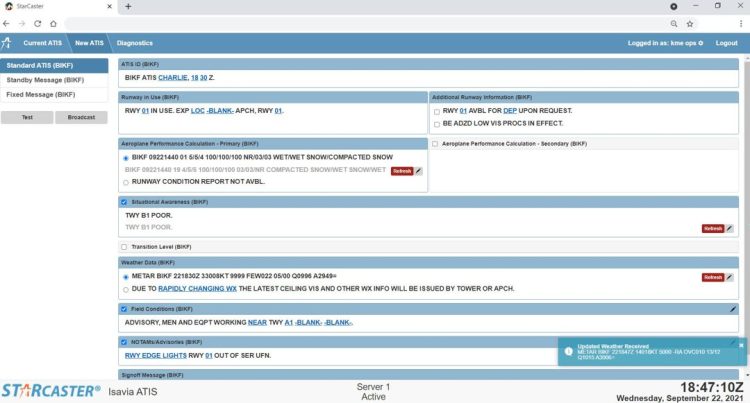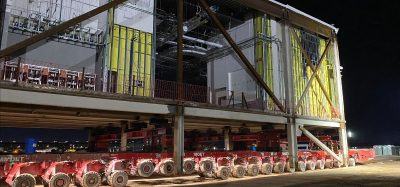Enhancing Operational Efficiency in Air Traffic Control
- Like
- Digg
- Del
- Tumblr
- VKontakte
- Buffer
- Love This
- Odnoklassniki
- Meneame
- Blogger
- Amazon
- Yahoo Mail
- Gmail
- AOL
- Newsvine
- HackerNews
- Evernote
- MySpace
- Mail.ru
- Viadeo
- Line
- Comments
- Yummly
- SMS
- Viber
- Telegram
- Subscribe
- Skype
- Facebook Messenger
- Kakao
- LiveJournal
- Yammer
- Edgar
- Fintel
- Mix
- Instapaper
- Copy Link
Posted: 14 March 2024 | STR-SpeechTech Ltd. | No comments yet
With nearly 300 StarCaster deployments worldwide, STR-SpeechTech continues to meet complex ATC requirements and aviation broadcasting demands.


Challenges in air traffic control operations
Safety is the foremost concern in Air Traffic Control (ATC). Ensuring the safety of aircraft and passengers amidst increasing air traffic volume and complexity is a constant challenge. ATC systems must be reliable and capable of quickly identifying and mitigating potential hazards such as airspace congestion, weather disturbances, and equipment failures.
Since 2020, the aviation sector has experienced a consistent increase in global air traffic levels as they approach pre-pandemic norms. In certain regions, air traffic has even surpassed pre-pandemic levels. While this growth is promising, the surge in travel volume intensifies the challenges faced by ATC operations.
Automatic Terminal Information Service (ATIS) and VOLMET (meteorological information for aircraft in flight) voice broadcasts continue to be the primary methods used by ATC to communicate critical weather and operational information to airspace users. However, manually recording these broadcasts can be time consuming, and interfere with the controller’s primary duties. Unpredictable weather conditions make the job more demanding, as controllers are constantly pulled away to update the broadcast message. A method of quickly and reliably updating operational information as conditions change allows controllers to put their time where it counts: air traffic safety.
To address these challenges, the field of ATC has seen the emergence of several innovative technological advancements, such as automation and virtualization technology. One noteworthy example of the application of these technologies is the StarCaster system developed by STR-SpeechTech.
StarCaster systems are deployed internationally at major commercial airports handling a high volume of passenger traffic, as well as regional facilities whose primary purpose is general or private aviation. Its user-friendly interface enables controllers to quickly access essential information and promptly compose ATIS and VOLMET broadcast messages. StarCaster’s intuitive design not only expedites message creation but also minimizes the likelihood of errors. Its reliability and quality are underscored by enduring customer relationships, with numerous systems operating internationally for nearly two decades.
Given the projected ongoing growth of international air traffic, ATC stakeholders at aerodrome facilities of varying traffic volumes are actively pursuing improved operational efficiency through cost-effective innovative solutions. Furthermore, their focus remains on prioritizing quality systems that maintain their value over their lifespan.
Enhancing operational efficiency and maintaining quality
In 2021, STR and Iceland’s Isavia set out to navigate this delicate balance between efficiency, cost and quality. Leveraging their longstanding relationship, both organizations worked together to enhance the ATIS infrastructure at Keflavik Airport (BIKF), originally installed in 2007.
The project commenced with a detailed review of the current ATIS infrastructure which developed into a comprehensive, centralized ATIS system design, leveraging Isavia’s established datacenter at Keflavik Airport (BIKF) and STR’s enterprise-level StarCaster software. The project aimed to bolster flight safety in the region by utilizing Isavia’s network infrastructure to offer a reliable D-ATIS service for Keflavik Airport (BIKF), Reykjavik Airport (BIRK), and Akureyri Airport (BIAR). Ensuring ATC’s trust in this expanded service was crucial, alongside its full compliance with all regulatory standards, notably the newly implemented ICAO Global Reporting Format (GRF) for reporting runway conditions.


By centrally managing services, this project significantly reduced the hardware demands and maintenance costs typically associated with supporting such an expansion of ATC tower operations, providing an efficient, scalable and cost-effective centralized solution that supports the long-term operational requirements of ATC.
In response to end user requirements, ATIS and VOLMET systems are continually evolving with new industry technologies to create operational efficiencies without sacrificing quality. StarCaster has been at the forefront of these industry trends by utilizing emerging technologies, such as virtualization, to extend services, streamline processes, and optimize performance.
Supporting real-time monitoring and decision making
Even when operating at its highest level of efficiency, ATC traditionally functions in real-time, with instructions being issued as events unfold, and human controllers overseeing numerous monitoring and decision-making responsibilities. The automation of operational procedures provides significant benefits to controllers as they navigate multiple tasks and priorities. These benefits can be achieved by interfacing ATIS and VOLMET systems with various external systems within the ATC environment, including:
- Weather data systems, facilitating the automated reception and processing of data from diverse weather feeds (such as AWOS, AFTN, or AMHS);
- ED-137B VoIP transmitters, enabling direct streaming of voice broadcasts over Voice over Internet Protocol;
- Datalink service, enabling the up-link of text for each newly generated message to ACARS-equipped aircraft.
The advantages of effectively implementing these technologies are demonstrated in STR-SpeechTech’s recent projects in Europe, which focused on delivering efficient StarCaster solutions that fully comply with all ICAO and regional regulatory standards.
Most recently in 2023, STR completed the delivery, installation and site acceptance of a StarCaster D-VOLMET solution at AirNav Ireland’s (AirNav) North Atlantic Comminication Centre (Shannon Aeradio). This project marked the successful upgrade of the previous StarCaster system that was installed in December 2008 and ran without interruption for 15 years.
Irish controlled airspace acts as a gateway between Europe and North America, with Shannon Aeradio providing a long-range voice communication service for Oceanic Air Traffic Control (ATC) in the Eastern half of the North Atlantic. StarCaster enhances Shannon Aeradio’s operations by automating the acquisition of weather data and implementing ED-137B VoIP and datalink technologies to increase accessibility of the service. This design ensures the provision of a continuous VOLMET Broadcast to airspace users, delivering SIGMETs, terminal forecasts, and real-time weather observations for the primary airports across Europe.


Cost-effective solution for regional airports
The demand for reliable and innovative ATC systems now extends beyond Air Navigation Service Providers and major commercial airports. Smaller regional airports are upgrading their ATC infrastructure to bolster safety for general and private aviation activities. Systems such as ATIS, are being actively pursued because of their cost-effectiveness and reliability in improving operational efficiency around the clock, even during periods of tower closures.
For example, in 2023 STR completed the delivery, installation and commissioning of an ICAO Global Reporting Format (GRF) compliant StarCaster D-ATIS system for Airbus at Hamburg Finkenwerder Airport (EDHI), Germany to support transfer, freight, and test flights for Airbus manufacturing.
The D-ATIS system at EDHI consists of a fully redundant StarCaster D-ATIS system that manages ATIS messages consisting of the current weather, runway conditions and airport operational information, for broadcast over ED-137B-compliant VHF transmitters. StarCaster is interfaced with an external AWOS system via TCP/IP to continuously receive the latest weather observations. ATC personnel access StarCaster’s feature-rich Human Machine Interface (HMI) via a common web-browser over secured internet connection.
Summary
Safety remains the top priority in Air Traffic Control (ATC), particularly amidst the escalating volume and complexity of air traffic management. The steady rise in global air traffic levels has heightened the conventional challenges encountered by ATC operations, prompting the need for innovative solutions that uphold safety standards and improve communication without sacrificing quality. Utilizing ATIS and VOLMET systems to accurately and reliably distribute pertinent operational and runway information to airspace users is essential. This imperative extends to stakeholders across both large commercial airports and smaller regional facilities, all of which stand to gain from enhanced operational efficiencies. StarCaster remains at the forefront of these industry trends, utilizing emerging technologies to optimize performance, increase accessibility, streamline processes and reduce costs.
Visit STR-SpeechTech at stand 019 at Airspace World.
Discover innovative solutions to rising ATC challenges. Learn how to optimize performance and streamline communications.


About STR-SpeechTech Ltd.
STR-SpeechTech is the leading supplier of text-to-speech systems for mission-critical broadcasting applications. STR’s StarCasterⓇ text-to-speech systems are deployed throughout the world at Air Traffic Control Towers and Flight Service Stations, where the ability to generate clear and consistent aviation information broadcasts in a natural voice is a key component of operational efficiency and safety. Located in Victoria, Canada, STR has been dedicated to meeting our customers’ needs for 35 years.
Paid promotion by STR-SpeechTech Ltd.


















